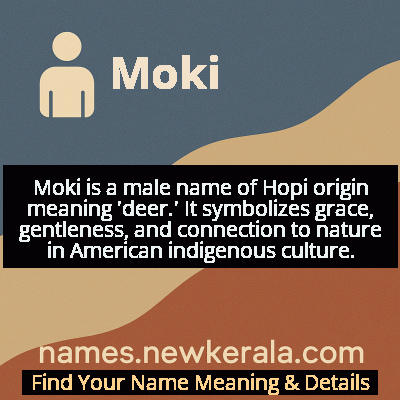Moki Name Meaning & Details
Origin, Popularity, Numerology Analysis & Name Meaning of Moki
Discover the origin, meaning, and cultural significance of the name MOKI. Delve into its historical roots and explore the lasting impact it has had on communities and traditions.
Name
Moki
Gender
Male
Origin
American
Lucky Number
3
Meaning of the Name - Moki
Moki is a male name of Hopi origin meaning 'deer.' It symbolizes grace, gentleness, and connection to nature in American indigenous culture.
Moki - Complete Numerology Analysis
Your Numerology Number
Based on Pythagorean Numerology System
Ruling Planet
Jupiter
Positive Nature
Optimistic, inspirational, and creative.
Negative Traits
Scattered, exaggerating.
Lucky Colours
Yellow, gold, purple.
Lucky Days
Thursday.
Lucky Stones
Yellow sapphire.
Harmony Numbers
1, 2, 9.
Best Suited Professions
Arts, writing, communication.
What People Like About You
Creativity, optimism.
Famous People Named Moki
Moki Kokori
Environmental Activist
Led conservation efforts for Southwestern wildlife habitats and indigenous land rights
Moki Martin
Artist and Sculptor
Renowned for bronze sculptures depicting Native American themes and wildlife
Moki Halsey
Cultural Educator
Founded educational programs preserving Hopi language and traditions
Moki Bear
Community Leader
Organized intertribal youth programs focusing on cultural preservation
Name Variations & International Equivalents
Click on blue names to explore their detailed meanings. Gray names with will be available soon.
Cultural & Historical Significance
Beyond its literal meaning, Moki embodies the Hopi concept of 'Hopivotskwani' - the Hopi path of life that emphasizes humility, respect, and living in harmony with all creation. The deer's characteristics of alertness, grace, and gentle strength are qualities highly valued in Hopi society. When given this name, it's believed the child will embody these deer-like qualities throughout their life, serving as a reminder of the interconnectedness of all living things and the importance of moving through life with purpose and awareness.
Extended Personality Analysis
Individuals named Moki are often perceived as gentle, intuitive, and deeply connected to nature, reflecting the deer's symbolic qualities. They typically exhibit a calm demeanor and thoughtful approach to life, moving through challenges with grace and adaptability rather than force. These individuals tend to be highly observant and sensitive to their surroundings, possessing an innate understanding of people and situations. Their gentle nature doesn't indicate weakness but rather a strategic approach to life that values harmony and peaceful resolution.
Moki's often demonstrate strong loyalty to family and community while maintaining a sense of independence and personal freedom, much like the deer that moves gracefully through the forest while remaining connected to its herd. They are typically creative problem-solvers who prefer diplomatic solutions to conflicts and have a natural ability to mediate between opposing viewpoints. Their intuitive nature makes them excellent judges of character, and they often serve as trusted confidants and advisors within their social circles. While they may appear reserved initially, those who earn their trust discover individuals of deep emotional intelligence and unwavering integrity.
Modern Usage & Popularity
In contemporary times, Moki has gained popularity beyond its Hopi origins, particularly among parents seeking unique names with natural and spiritual significance. While still relatively uncommon, its usage has increased in the American Southwest and among families with appreciation for indigenous cultures. The name appeals to modern parents drawn to short, distinctive names that carry deep meaning without being overly complicated. It's particularly favored in communities valuing environmental consciousness and cultural diversity. Recent years have seen a gradual rise in usage, though it remains outside the top 1000 names nationally, maintaining its unique character while becoming more recognized in multicultural settings. The name's appeal lies in its combination of cultural authenticity, pleasant sound, and meaningful symbolism that resonates with contemporary values of environmental stewardship and cultural appreciation.
Symbolic & Spiritual Meanings
Symbolically, Moki represents grace under pressure, gentle strength, and spiritual awareness. The deer symbolism extends to concepts of intuition, sensitivity, and the ability to navigate life's challenges with elegance rather than aggression. It embodies the idea of being in tune with one's environment while maintaining personal boundaries and independence. The name also carries connotations of renewal and regeneration, as deer shed and regrow their antlers annually, symbolizing personal growth and transformation. In a broader sense, Moki represents the balance between community connection and individual freedom, mirroring how deer move between solitary exploration and herd protection. The deer's ability to move silently through the forest symbolizes discretion and thoughtful action, while its alertness represents mindfulness and presence in the moment.

